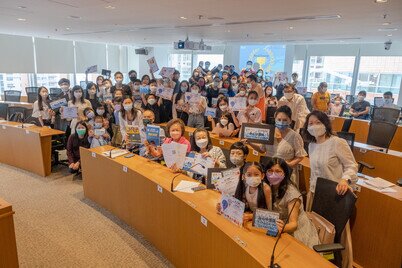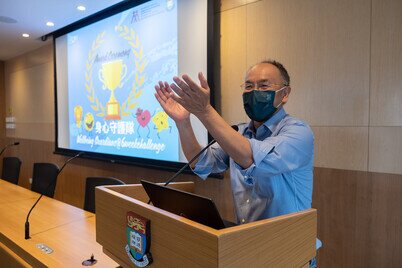Lifting the Burden of Hopelessness
"We want to intervene well before someone needs professional help, so we have moved away from a medical approach to a bio-psycho-social approach. Suicide is not only a medical problem, it’s a public health problem."
Probably no person has done more to prevent suicide in Hong Kong than Professor Paul Yip Siu-fai, Chair Professor (Population Health) at the Department of Social Work and Social Administration and, since 2002, Director of the Hong Kong Jockey Club Centre for Suicide Research and Prevention (CSRP). The Centre has not only provided much needed data on trends and outcomes, but it has also collaborated with NGOs, government bureaus and other stakeholders on developing new prevention programmes.
The direct impact of this work has seen individual lives saved and has coincided with a fall in Hong Kong’s suicide rate from 18.6 per 100,000 people in 2003 to 11 today (roughly 900 per year).
Over that period, Professor Yip’s mission expanded to not only help people in urgent need but to promote wellness in the community as a whole – a measure he sees as equally if not more important in preventing suicide. “We want to intervene well before someone needs professional help, so we have moved away from a medical approach to a bio-psycho-social approach. Suicide is not only a medical problem, it’s a public health problem,” he said, pointing to the World Health Organisation’s statement that there is no health without mental health.
To advance wellness, his centre has developed and tested a number of programmes that meet different kinds of needs.
During the COVID-19 pandemic, for instance, they produced an online “Wellcation” package for people stuck in hotel quarantine that provided daily activities and reflective writings focused on mental wellness. The Hong Kong government helped out by having the package translated into nine ethnic minority languages besides Chinese and English. Well over 150,000 individuals accessed Wellcation packages from around the world and surveys by Professor Yip’s team found that those who did so were unlikely to experience a deterioration in mental health during quarantine.
“We think this is an achievement already because people being locked up like that will have felt isolated and lonely and frustrated, especially those predisposed to a mental health problem like depression,” he said.
The team also targeted young people during the height of the fifth COVID-19 wave in March 2022 when schools were shut, with the “Wellbeing Guardians” programme. This offered six weeks of challenges to promote students’ interactions and bonding with family and friends and to increase their ability to cope with negative emotions. The programme was embraced by the Education Bureau which helped to disseminat it online to students, while Ocean Park and the Community Partner Foundation provided prizes for students who completed the programme.
Both the Wellcation and Wellbeing Guardians programmes remain accessible online, but Professor Yip and his team are now focused on a longer-running initiative for young people called Open Up. This was launched in 2018 in collaboration with five NGOs and funding from the Hong Kong Jockey Club Charities Trust and aims to meet vulnerable young people where they are most comfortable – online.
Young people in need of emotional support can connect 24 hours a day, anonymously, with a trained counsellor via text. The counsellor will engage with them for an hour or so, listening and offering advice and referrals to offline and thematic services if the youth should need more assistance. These services are provided by the five NGOs.
Open Up was co-created with HKJC and it was started in light of research by Professor Yip that found three-quarters of young people who die by suicide are not known to the medical and social welfare system – they have not received help before taking their lives.
“The majority of people who come to Open Up are at low or no risk of suicide, but we believe this is still doing the job because we can prevent them from becoming medium or high risk,” he said. The government agrees and plans to incorporate the model into its own services by 2025.
Still, despite these efforts, suicide is on the rise among young people even as the overall suicide rate has fallen. It is not a local problem but a global challenge. Professor Yip and his team have been tracking this and over the past decade have developed mental wellness programmes for secondary schools, primary schools and kindergartens, with the support of the Education Bureau. “Mental wellness programmes should start as early as possible – the earlier the better,” he said.
Echoing that need was the sad news this spring that an 11-year-old child committed suicide. “One death is too many and most of them can be avoided,” Professor Yip said. “It is an uphill battle to provide help, but we are not going to give up. We will do our best to reduce such tragedies.”



